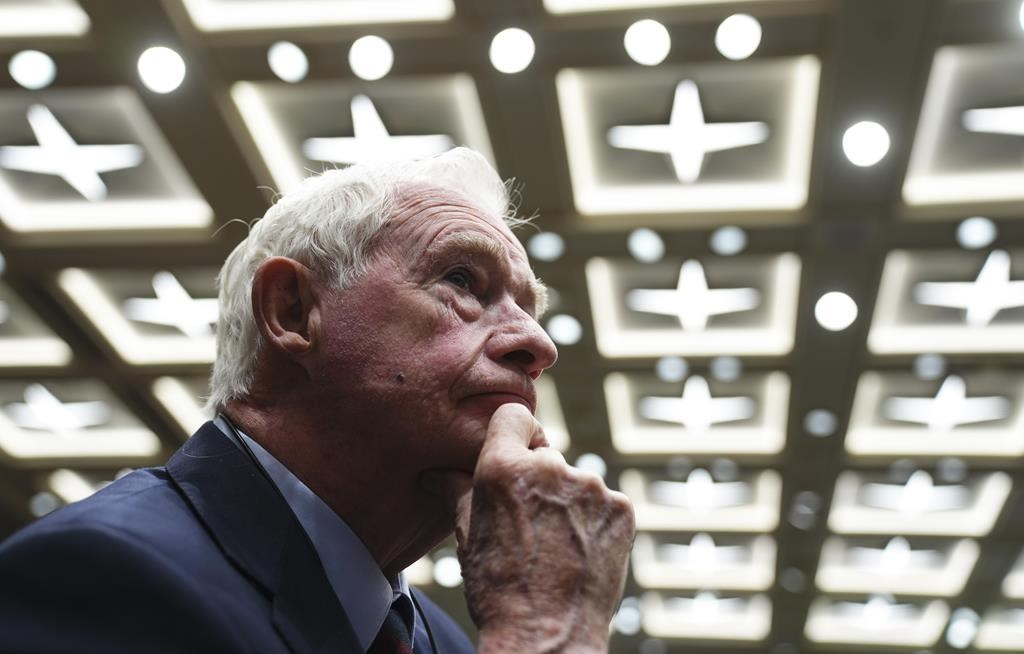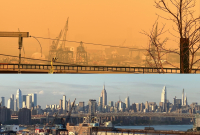Support strong Canadian climate journalism for 2025
OTTAWA — David Johnston says he is stepping down from his role as special rapporteur investigating foreign interference before the end of June, citing the highly partisan atmosphere around his work.
The former governor general said in a letter to Prime Minister Justin Trudeau on Friday that his objective in leading the government's probe into alleged meddling by China was to help build trust in democratic institutions.
"I have concluded that, given the highly partisan atmosphere around my appointment and work, my leadership has had the opposite effect," he said.
Johnston's appointment has been contentious, with Conservative Leader Pierre Poilievre repeatedly accusing him of being too close to Trudeau's family to provide an unbiased review of government actions.
Last week, MPs passed a non-binding NDP motion calling on Johnston to step down due to that perceived bias. Johnston was friends with Pierre Elliott Trudeau and went on ski trips with the Trudeau family when Justin was a child.
On Tuesday, he told a committee he planned to stay in his role because "the vote was based on allegations that were false, and that it'd be wrong for me to simply step aside and let those allegations stand as fact and truth."
All opposition parties have been calling for the government to call a public inquiry into foreign interference.
Beginning last fall, the Globe and Mail and Global News published a series of reports that cited unnamed security sources who alleged there was a co-ordinated effort by Beijing to interfere in the last two federal elections.
In March, facing increasing pressure inside and outside the House of Commons, Trudeau named Johnston as special rapporteur and tasked him with setting a path forward for the government in tackling the issue. He was asked to report back by May 23 on whether that should include a public inquiry.
"A deep and comprehensive review of foreign interference, its effects and how to prevent it should be an urgent priority for your government and our Parliament," Johnston wrote Friday.
He reiterated the conclusion he came to in his report last month, which said that a public inquiry would not be useful given the constraints of national security laws and the amount of classified information that will be dealt with.
He suggested public hearings should be held to educate Canadians about how foreign interference happens and how to manage it.
Those hearings, which were supposed to make up the second part of his mandate over the next five months, were set to include testimony from government representatives, national security officials and members of the Chinese diaspora. The work was to be supported by three special advisers with expertise on national security intelligence, law and diaspora communities.
Johnston said Friday that he will instead release a brief final report no later than the end of June. That will conclude his work.
As he stepped aside, Johnston encouraged Trudeau to appoint a "respected person with national security experience" to finish the work he started, and suggested he consult with opposition parties on who that should be.
Intergovernmental Affairs Minister Dominic LeBlanc said in a statement Friday evening that he has been asked to consult experts and opposition parties on the next steps "and to assess who is best to lead that work."
"As I take on this assignment, our efforts to combat foreign interference in our democracy continue, as do the ongoing reviews of the classified annex of Mr. Johnston's report, and the work of both the National Security and Intelligence Committee of Parliamentarians and the National Security Review and Intelligence Agency," LeBlanc said.
Opposition politicians said the resignation is another signal that a public inquiry should begin.
"When we tabled our motion calling for the special rapporteur to step aside, we said that the appearance of bias was too much to continue," NDP Leader Jagmeet Singh said in a statement, adding that he believes Johnston is an honourable man.
Singh said Johnston fell victim to "the bungled handling of foreign interference by the Liberal government," but said his report outlined real and alarming gaps in national security.
"We are also calling on the government to work with opposition parties on an action plan that can begin to address these gaps and ensure the trust of Canadians in our democracy," he said.
Bloc Québécois Leader Yves-Francois Blanchet said in French that he salutes Johnston's dignified decision, and that Trudeau has no choice now but to call a public inquiry.
Poilievre said in a statement that Trudeau has been "flailing around for months trying to cover up the help he got from Beijing's Communist government," and accused him of destroying Johnston's reputation. He, too, called for a public inquiry.
A task force of senior civil servants has monitored each of the last two federal elections for signs of foreign interference. While it reported there were attempts to interfere, it concluded that none of those attempts rose to the level of threatening the integrity of the vote.
The director of the Canadian Security Intelligence Service, David Vigneault, told a House committee in March that the 2019 and 2021 elections were free and fair.
Poilievre has repeatedly said he does not doubt the results of either election.
Conservative MP Erin O'Toole called Johnston an "exceptional Canadian" in a tweet of his own, thanking him for his service to the country.
"It is so disappointing that the prime minister used his stellar reputation as a political shield," he wrote.
This report by The Canadian Press was first published June 9, 2023.





Comments
By all means, let's continue getting our tail's in a knot about foreign interference, while our boreal goes up in smoke. Nothing like keeping the plebs distracted while their homes burn.....or fill with the noxious smoke guaranteed to increase health costs in the bleak future we speed toward.
Afraid of China??? Ready to Trash the Reputation of whoever is naive enough to step up next to look into this threat in a china cup???
Conservative politicians are going to be the death of us all. Let's get it over and vote for em.
Johnston is just a bagman who protected Mulrony from the $300 K bribe Mulroney took from Karlheinz Schreiber in the Airbus scandal. Harper rewarded him by naming him Governor General, knowing that gave Harper total freedom to prorogue parliament.
Chretien had to shut down embarrassing inquests and after the Gomery inquiry said they never should have had an inquiry. Clearly, Justin learned this lesson and knew that Johnston would do whatever Justin wanted.
Johnston is a bagman lured to power like a moth to flame. Finally, Johnston is a political dead letter with Mulrony free and Justin with no inquiry.